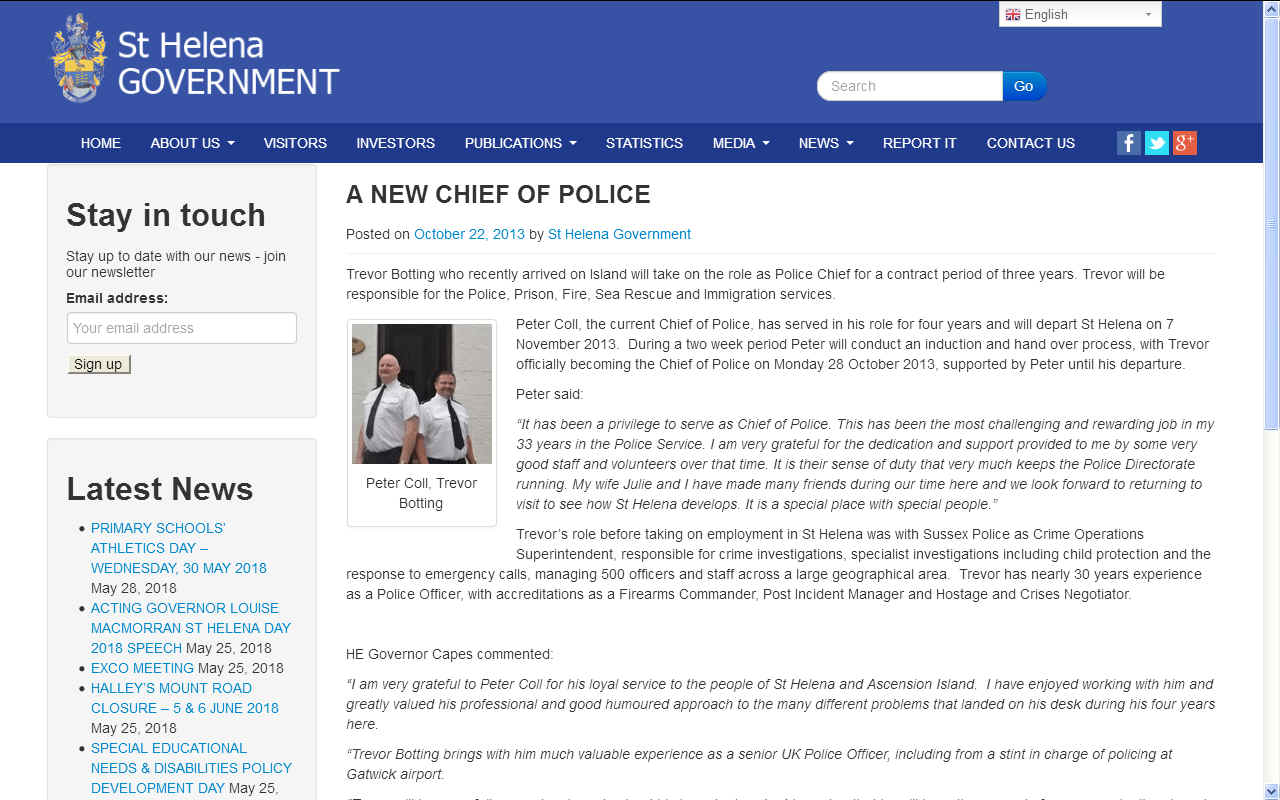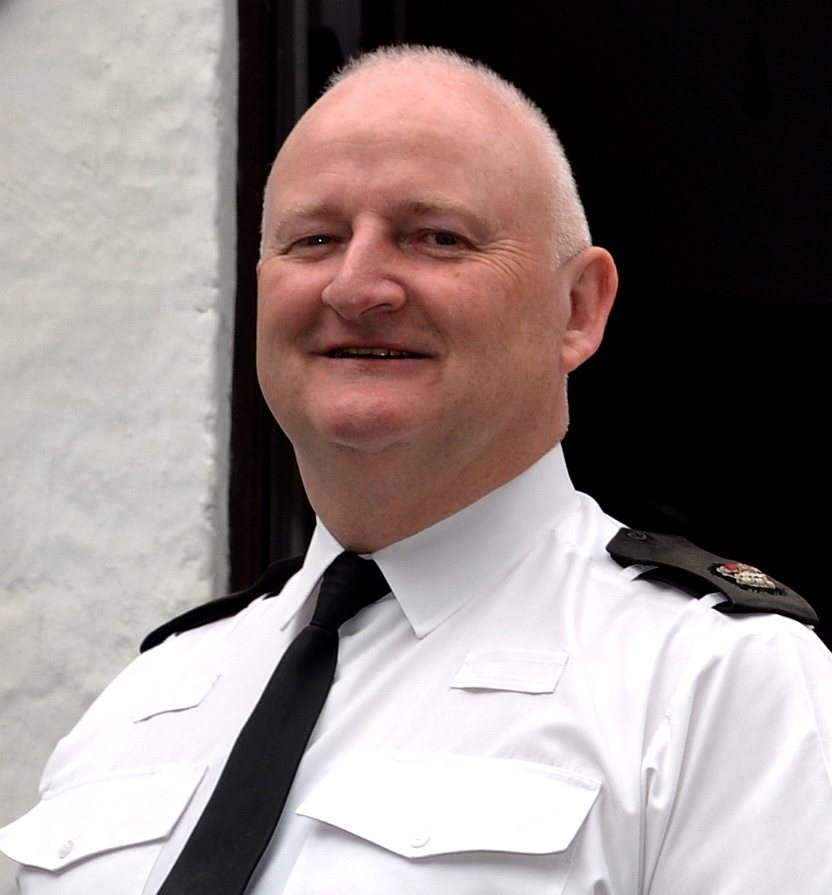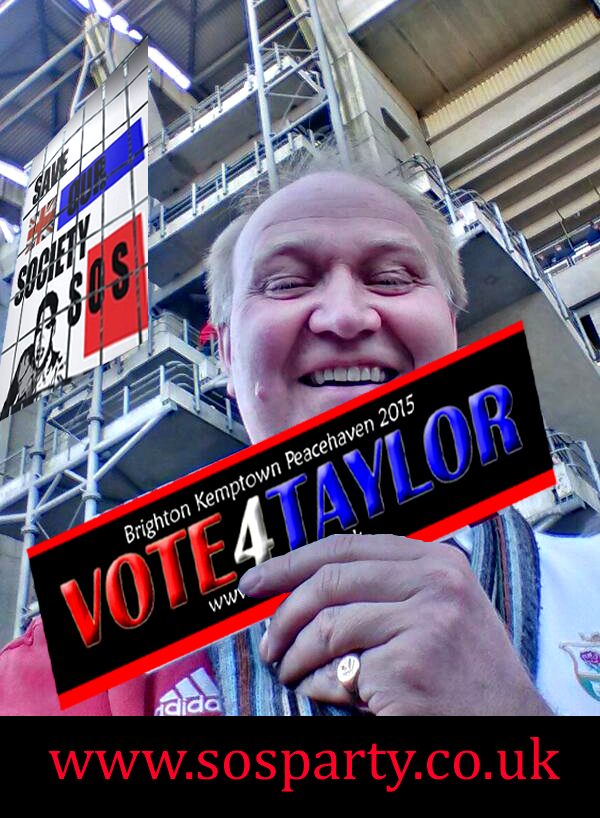|

ST
HELENA GOVERNMENT 22 October 2013
Trevor Botting who recently arrived on Island will take on the role as Police Chief for a contract period of three years. Trevor will be responsible for the Police, Prison,
Fire, Sea Rescue and Immigration services.
Peter Coll, the current Chief of Police, has served in his role for four years and will depart St Helena on 7 November 2013. During a two week period Peter will conduct an induction and hand over process, with Trevor officially becoming the Chief of Police on Monday 28 October 2013, supported by Peter until his departure.
Peter said:
“It has been a privilege to serve as Chief of Police. This has been the most challenging and rewarding job in my 33 years in the Police Service. I am very grateful for the dedication and support provided to me by some very good staff and volunteers over that time. It is their sense of duty that very much keeps the Police Directorate running. My wife Julie and I have made many friends during our time here and we look forward to returning to visit to see how St Helena develops. It is a special place with special people.”
Trevor’s role before taking on employment in St Helena was with Sussex Police as Crime Operations Superintendent, responsible for crime investigations, specialist investigations including
child protection and the response to emergency calls, managing 500 officers and staff across a large geographical area. Trevor has nearly 30 years experience as a Police Officer, with accreditations as a
Firearms Commander, Post Incident Manager and Hostage and Crises Negotiator.
Helena's Governor Capes commented:
‘‘I am very grateful to Peter Coll for his loyal service to the people of St Helena and Ascension Island. I have enjoyed working with him and greatly valued his professional and
good humoured approach to the many different problems that landed on his desk during his four years here.
“Trevor Botting brings with him much valuable experience as a senior UK Police Officer, including from a stint in charge of policing at Gatwick airport.
“Trevor will have my full support as he sets about his important work. I hope too that he will have the support of everyone who lives here to help keep St Helena (and Ascension Island) a safe and pleasant place for all to enjoy.”
During his command at Gatwick airport Trevor carried out a restructuring of the policing operation there. In a previous role as an Inspector at Gatwick he introduced an
airport community policing team to compliment the armed deployments as part of the overall policing operation.
Trevor said:
“My wife and I (who will join Trevor in December) are delighted to have the opportunity to live and work in such a special and unique place. It will be a privilege to lead the diverse teams that make up the Policing Directorate in serving the people of St Helena. I look forward to getting to know the people and the Island over the coming months.”

N J Kruschandl
The Old Steam House,
Lime Park, Herstmonceux,
East Sussex, BN27 1RF
Det. Sgt. Colin Dowle
Investigating Officer
Police Station
South Road
Newhaven
East Sussex BN9 9QJ
20 April 2001
Dear Sgt. Dowle
Formal Complaint – Misfeasance in public office
Wealden District Council
Thank you for your letter dated 9th April 2001, advising of your recent move, etc.
Please accept my apologies for not supplying a replacement contact number during these stressful times. The landline and previous mobile were discontinued in favour of the above number, which I hope will be more reliable.
A number of issues have arisen this year, leading me to conclude that this matter may not receive investigation at all despite your good intention to uphold the law. I should stress that this state of affairs is to do with the way the Police are funded and the apparent reluctance to investigate the goings on of the local authority, where it is often the case that the Police Authority and the Local Authority co-operate on other issues.
Please find enclosed copy of a letter I received from Mark Powell in November 2000. Please also find enclosed copy of a newspaper article concerning Inspector Piloni dated 2nd February 2001. The newspaper article appears to confirm the subject matter of the letter, in that if I provide any information to you of a crime not falling to be considered as a priority, the chances are it will not receive the attention it deserves.
Additionally, you will appreciate that my complaint encompasses evidence spanning many years. Some of this evidence is privileged and will be required in connection with other matters involving this Council. For this reason I would wish to limit my complaint to just one issue at this time. Although, a fresh matter has come to light – that of culpable overcharging, of which more later. Could you say if this kind of fraud is a criminal matter? As I understand it “Discrimination” under the
Human Rights Act is not a criminal offence. Could you say whether this is the correct position?
I remember when we first met to discuss this matter, I was told that there is no statute of limitation on crime. I would be grateful for confirmation on this point. I will also be grateful if you can confirm that the information I pass to you for your investigation to begin, will be treated in the strictest confidence and not be passed to the Council or even hinted at. I ask this because, the
Sussex Police receive their funding via the local authority and for this reason and others mentioned herein, there is an apparent conflict of interest. I would also ask if you or any of your fellow officers have been contacted by this Council concerning my case in the past few months?
One matter that worries me is the incident where the previous Wealden Chief Executive,
Derek Holness, was the author of a letter of vindication on Police headed paper after which it was signed by a Police officer. Mr Holness then read it to the full Council as if it had been received from and written independently by the Police. This appears to have been a deception. Clearly, there is the possibility that such a deception could happen again. If the Council have such influence with the Police as to write their own ticket, then there is no law where the Council is concerned. Unless, a complainant can be assured that in future any matter will be dealt with independently, hence impartially.
In line with the advice received in the letter cited above, I anticipate pursuing non-criminal issues by way of the Civil Courts. I am only asking the
Sussex Police to look at one matter at a time. Unless, of course, it transpires that the Police are investigating other similar cases, as similar fact evidence. I consider that it is very much in the public interest to expose corrupt practices at local level. It has been estimated that several billion pounds of public money are wasted each year by local authorities.
INITIAL COMPLAINT
My complaint in its simplest form is that Wealden were required by law to determine an application I made in April/May of 1998 (WD/98/0996/F) citing the correct history of the property concerned. The local authority were required to either determine this application within eight weeks or face an appeal.
However, it appears from the evidence that the local authority did not want to determine this application, as to do so might cast doubt as to the reliability of their officers information to Committee in years gone by. It is for this or associated reasons that I believe they cited Section 70A of the Town & Country Planning Act 1990 (as amended), claiming that the application was similar to one determined within a two year period. For this reason they claimed they could decline to determine the application as being a simple repeat or time wasting and in the absence of any new material considerations.
The Council could decline to determine the application under S.70A, provided there was no new information of a material nature, which should be take into consideration. However, there was new information available to them at that time. In fact it was the new information that prompted me to make the application, when it became clear to me that the Council had been wrong on some very important historical facts.
The Council (the Committee) had previously been told that the building in question was not an early electricity generating building as I had claimed. Back in 1995 and 1996 the Council’s conservationist (Ms Bird) had advised the planning Committee on this, first in her advice on which application(s) WD/95/2284/F & WD/96/1767/F were refused and later in an appeal statement. Whereas, Ms Bird’s statement was shown to be incorrect by the Affidavit of Ronald Saunders dated 16th July 1997.
The appropriate Council departments (Legal, Chief Executive, Planning & Enforcement) had been provided with a copy of Mr Saunders Affidavit, as had prominent Members, including the Leader of the Council. This new information meant that where the Council had previously relied on
Ms Bird saying that the building held no historical interest, they now had substantiated proof that Ms Bird had been wrong in her assessment.
However, the Council’s Mr Phillips, when asked of the new evidence, said to me that Mr Saunders Affidavit would make no difference to any application I might make “I could count on it”. Despite Mr Phillips saying this to me, I made the application fully aware that Mr Phillips would do his best to persuade the committee to look the other way concerning the history where I was concerned. Even though as a member of the Royal Town Planning Institute he knew very well what a history meant in planning terms where a redundant building was concerned. It had not occurred to me that Mr Phillips would involve other officers. However, if you listen to the recording using a computer, or read the transcript, it will become clear just how the Council’s officers mislead the Committee.
According to Circular 14/91 supplied to me by the Planning
Inspectorate, the Council were legally obliged to determine the application, provided the Affidavit of Ronald Saunders held information that was material to the application.
A letter from English Heritage dated 11th August 1999 confirms that the interest of the site is “considerable” and that this is a “material consideration”. This letter was based on a report which was based on the Affidavit of Mr Saunders. Another letter from the DETR says that history and archaeology are material considerations.
Clearly, the Council had refused to acknowledge the existence of Mr Saunders Affidavit, preferring their own experts version as to the history – which according to Ms Bird was a pump house built on the site of the original generating building. The evidence of Ms Bird is further confirmed to be wrong by a Survey dated 29th September 1999, wherein
Archaeology South East confirm the origins of the building.
THE CRIME
It is very often a criminal offence not to do something one is required by law to do. It is my understanding that it is not necessary to prove the state of mind of the person or body committing the offence, it is enough to show that the thing that was required to be done was not done.
In this case the function of the Council was to determine my application. The only exception being in the case where an applicant had not provided the Council with a material change in circumstances to warrant fresh consideration. However, I went to great lengths to ensure that Mr Phillips, Mr Moss,
Mr Scarpa, Mr Holness and the appropriate Councillors each received a copy of Mr Saunders’ Affidavit. Mr Phillips wrote in reply to the letter I sent with the Affidavit and so did
Cllr. Chidson, also confirming that other members had received their copy.
I think I have already provided you with the relevant caselaw where it is an offence for any person acting in an official capacity (holding office) to fail to carry out his or her duty. I sent a package which initiated this inquiry to Maria Wallis, which I think she passed to you with the case file.
EVIDENCE
My evidence in support of the above complaint is:
1) Assessment on Ms Bird 1995 & 1996
2) Affidavit of Ronald Saunders July 1997
3) Application WD/98/0996/F
4) Transcript and recording of APS meeting June 1998
5) Notice of Refusal to Determine 29 June 1998
6) Letter from Inspectorate enclosing Circular 14/91 December 1998
7) Letter from DETR “archaeology and history each material” May 1999
8) Letter from English Heritage August 1999
9) Survey Archaeology South East September 1999
The relevant Planning Law is seen in:-
1. PPG16
2. English Heritage publications
3. Wealden’s Local Plan @ DC10
Obviously, I have much more evidence to support my case. But this evidence is more concerned with the long-term frustration and malice (dirty tricks) which has been and continues to be the cause of unrelenting worry, stress, depression and loss of direction.
I enclose the above documents for your consideration and look forward to hearing from you in respect of the contents of this letter.
Yours sincerely
Nelson J Kruschandl – INFORMANT
HANSARD
HOUSE OF COMMONS, MONDAY 11th FEBRUARY 2002
The Wilding report found a complete failure of corporate duty by Sussex police. The Hampshire inquiry concluded that three police officers lied about intelligence in order to persuade Deputy Chief Constable Mark Jordan to authorise the
raid on James Ashley's flat. The report found that the raid was:
"authorised on intelligence that was not merely exaggerated, it was determinably false ... there was a plan to deceive and the evidence concocted."
The chief constable was castigated. Sir John Hoddinott concluded that Paul
Whitehouse, the then chief constable,
"wilfully failed to tell the truth as he knew it, he did so without reasonable excuse or justification and what he published and said was misleading."
Sir John found evidence against Deputy Chief Constable Mark Jordan. That included criminal misfeasance and neglect of duty, discreditable conduct and aiding and abetting the chief constable's false statements. There was suggested evidence of collusion between some or all of the chief officers and an arguable case of attempting to pervert the course of justice.

MORE
MALFEASANCE IN SUSSEX
The
well known dissident, Nelson
Kruschandl is just one of a number of local Sussex
residents who are victims of Wealden's various vendettas
that amount to institutionalised
discrimination.
The
frequency of the events alleged is suggestive of an ingrained agenda that
operates to keep planning consents out of the reach of certain
residents,
to the benefit of other better connected concerns. The chief executive of
this council, Charles
Lant is believed to be implicated by virtue of not acting to prevent
crime in his council. The leader of the council, Bob Standley is alleged
to have been put on notice as the some of these matters, but is seems is
also sitting on his hands. The operations of this
council are alleged to amount to a course of malicious
conduct or even fraud,
as defined by the Fraud
Act 2006.
Even
more worrying is whether or not the Sussex Police is party to these
allegations of serious crimes and what part their Chief
Constable, Giles York plays in all of
this. It would be a feather in any police
officer's career if he or she uncovered corrupt practices at a higher
level and was brave enough to expose those cover-ups. It is a criminal
offence to know of a crime and not report or investigate it.
It
is alleged that Sussex police are complicit in the agenda of Wealden
District Council to rubbish their dirtiest darkest secret by framing
the occupier of the historic building that George
White and Thomas
Hoy lied about on oath before Inspector
Raymond Dannruether in 1986-1987.
It
is alleged that as a result of deceiving Mr Dannreuther that they obtained
a fraudulent instrument with which to torment Nelson Kruschandl with
preventing him from developing his talents as a creative engineer and
destroying a marriage and a second long term common law relationship,
driving him into a relationship with an unstable psychiatric nurse who was
also a single mother.
It
is alleged that as Mr Kruschandl became more successful in planning appeals
and in defeating enforcement actions against the protagonist council, that
they sought a way to bury him - and that they did this by grooming the
feelings of the daughter of the psychiatric nurse after an engagement was
called off, leading to an acrimonious split where the young girl was
emotional putty in the hands of social services who coached her,
fabricating a story for her that relied on there being no evidence to contradict
her story.
It
is alleged that the Sussex police conspired with the CPS
and a trial Judge, Cedric Joseph,
to gain a conviction against a charge of multiple rapes, where their
witness was still intact and a virgin
when inspected by Melanie
Liebenberg, a witness who also aided
and abetted the gaining of this conviction by misinforming the jury as
to marks that are naturally occurring, suggesting that they must be from
foul play when she must have known otherwise.
It
is alleged that Gordon Staker and James
Hookway deliberately failed to secure the so-called crime scene,
avoiding collecting any evidence that was inconsistent with the allegation
they had been tasked to prove. That in doing so they knew that the
defendant would be unable to mount any kind of defence where the police
controlled the crime scene - and that they were possibly ordered to act in
a manner in violation of their:
DUTY TO INVESTIGATE REASONABLE LEADS – CRIMINAL PROCEDURE and CRIMINAL INVESTIGATION ACT 1996 (CPCIACPO) and CODE OF PRACTICE ORDER APRIL 2005
Sections 3.4 and 3.5 of the CPCIACPO require the investigating officers in a case to:-
“ pursue all reasonable lines of inquiry, whether these point towards or away from the suspect”
It follows that any failure on the part of the investigating team, to reasonably secure evidence which they could obtain, may render the eventual trial unsafe, since such evidence, had it been obtained – had the potential to yield exonerating facts or cast doubt as to the reliability of claims, etc. Such investigations must fall under the duty umbrella imposed by Article 6(1) – the right to a: “fair and public hearing,” which is governed by a Code established by the Attorney Generals Guidelines, seen in Archbold’s Criminal Pleadings, and other common law precedents, in addition to the above Order.
It
is further alleged that the police investigators had
full knowledge that the defendant was Legally
Aided and did not have the resources to challenge the might of the
state where the Sexual
Offences Act 2003, introduced by David
Blunkett, reverses the burden of proof contrary to Articles
10 and 11
of the Universal
Declaration of Human Rights.
MISFEASANCE
& MALFEASANCE
When
an officer of the courts omits to include evidence that he knows is
relevant to a hearing, that is termed misfeasance in public office.
Where an officer then tries to cover up his or her misfeasance (as did
Ian Kay in the Stream Farm matter), that becomes malfeasance. The
difference is that misfeasance is a civil wrong, whereas malfeasance is
a criminal offence. The leading case
precedent on malfeasance is: R. v Bowden
1995 Court of Appeal (98 1 WLR).

Vicarage Lane, Hailsham,
East Sussex, BN27 2AX T: 01323 443322
SUSSEX
POLICE A
- Z OF OFFICER INVESTIGATIONS
Aran
Boyt
Chris
Sherwood
Colin
Dowle
Jane
Rhodes
Jo
Pinyoun
Joe
Edwards
Giles
York
Gordon
Staker
James
Hookway
Kara
Tombling
Keith
Stoneman
Ken
Jones
Maria
Wallis
Mark
Jordan
Martin
Richards
Neil
Honnor
Nigel
Yeo
Olivia
Pinkney
Paul
Whitehouse
Peter
Coll
Robert
Lovell
Sarah
Jane Gallagher
Sir
Ken Macdonald QC
Timothy
Motram
LINKS & REFERENCE
http://www.sainthelena.gov.sh/a-new-chief-of-police/
http://www.theargus.co.uk/news/15153523.Sex_on_duty__Chief_inspector_and_sergeant_investigated_over_allegation/
https://uk.linkedin.com/in/colin-dowle-40544737
https://www.eastbourneherald.co.uk/news/awards-for-officers-in-crime-crackdown-1-1417787
http://www.sussex.police.uk/
http://www.wealden.gov.uk/


Paul
Whitehouse (1993-2001) Ken
Jones (2001-2006) Joe
Edwards (2006-2007) Martin
Richards (2008-2014) Giles York (2014
>>)

|





